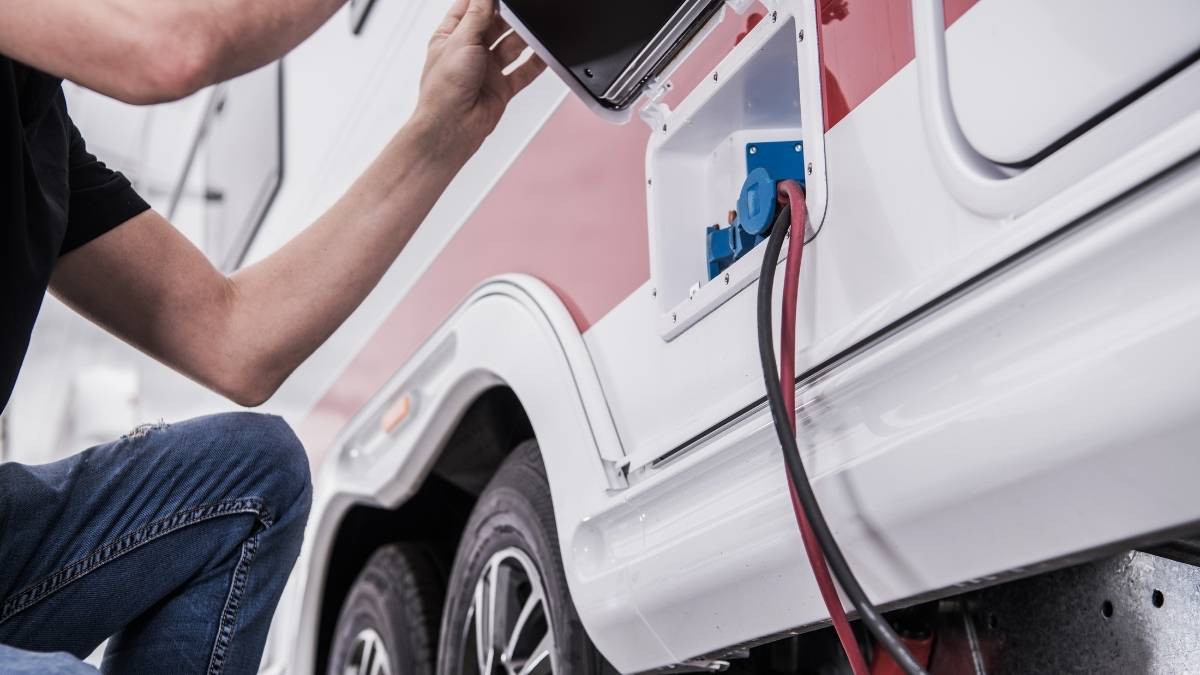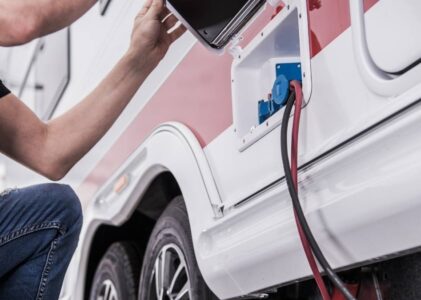Are you an avid traveler with a penchant for adventure? Do you dream of exploring the great outdoors while enjoying the comfort of your own campervan? If so, you’re not alone. Campervan travel has gained immense popularity in recent years, offering the freedom to roam, explore, and camp in some of the most beautiful and remote locations on Earth.
However, one of the critical challenges that campervan enthusiasts face is managing electricity and power needs while on the road. Unlike traditional homes, campervans require a unique approach to power management to ensure you can power your appliances, devices, and lighting without running out of juice in the middle of nowhere.
In this comprehensive guide, we’ll walk you through everything you need to know about managing electricity and power needs in your campervan. From understanding your energy requirements to choosing the right power sources and optimizing your energy usage, we’ve got you covered.
Understanding Your Energy Requirements
Before embarking on your campervan adventure, it’s essential to assess your energy needs. Different travelers have different requirements based on the appliances and devices they plan to use. To get started, create a list of all the electrical equipment you intend to bring on your journey. Common items may include:
- Lighting: Interior and exterior lights to illuminate your campervan during the night.
- Refrigerator: If you plan to store perishable items, you’ll need a power source to run your fridge.
- Cooking Appliances: Electric stoves, microwaves, or induction cooktops require electricity to function.
- Entertainment: Laptops, tablets, TVs, and gaming consoles can keep you entertained on the road.
- Climate Control: If you have air conditioning or a heater in your campervan, these also require power.
- Charging Devices: Smartphones, cameras, and other gadgets need to be charged regularly.
Once you’ve compiled your list, calculate the power consumption of each item in watts. You can typically find this information on the manufacturer’s label or in the user manual. Add up the total wattage to determine your daily energy consumption.
For example, if your lighting consumes 50 watts, your fridge uses 100 watts, and your laptop requires 60 watts, your daily energy consumption would be 210 watts. Multiply this by the number of hours you plan to use these appliances to get your daily energy requirement.
Power Sources for Your Campervan
Now that you know your energy requirements, it’s time to explore the various power sources available for your campervan. Depending on your preferences, budget, and the level of self-sufficiency you desire, you can choose from the following options:
1. Battery Systems
Battery systems are a popular choice for campervan enthusiasts. They provide a reliable source of electricity without the need for a constant external power supply. There are two main types of batteries you can consider:
a. Deep-Cycle Batteries
Deep-cycle batteries are designed for prolonged, consistent discharge and recharge cycles. They are ideal for campervans as they can handle the demands of running appliances and devices. These batteries come in various sizes and capacities, so choose one that matches your energy needs.
b. Lithium Batteries
Lithium batteries have gained popularity due to their lightweight and high energy density. They can store more power in a smaller space compared to traditional lead-acid batteries. While they tend to be more expensive upfront, they offer better performance and a longer lifespan.
2. Solar Power
Harnessing the power of the sun is an eco-friendly and sustainable way to generate electricity for your campervan. Solar panels installed on the roof of your vehicle can capture sunlight and convert it into electrical energy. Here’s how it works:
- Solar panels collect sunlight and convert it into direct current (DC) electricity.
- A charge controller regulates the flow of electricity to prevent overcharging.
- An inverter converts the DC electricity into alternating current (AC), which powers your appliances and devices.
Solar power is a fantastic option for campervans that spend a lot of time outdoors, as they can recharge the battery during the day. It’s also a silent and clean energy source.
3. Generator
Generators are a traditional but reliable option for powering your campervan. They run on gasoline, propane, or diesel fuel and can provide a constant source of electricity as long as you have fuel available. Some campervans come equipped with built-in generators, while others require a portable generator.
Portable generators are versatile, but they can be noisy and produce emissions. If you opt for a generator, consider models with sound-dampening features and eco-friendly technologies.
4. Campground Hookups
When you stay at established campgrounds or RV parks, you often have access to electrical hookups. These hookups provide a direct source of power to your campervan, allowing you to run all your appliances without worrying about battery depletion. While convenient, keep in mind that you may have to pay extra for these hookups, and they may not be available in remote locations.
Managing Electricity and Power
To make the most of your campervan’s power sources and extend your time off the grid, it’s essential to optimize your energy usage. Here are some tips to help you conserve energy:
1. LED Lighting
Replace traditional incandescent bulbs with energy-efficient LED lights. LEDs use significantly less power and last longer, making them ideal for campervans.
2. Insulation
Properly insulating your campervan can help regulate temperature, reducing the need for heating or cooling. This can save a considerable amount of energy.
3. Energy-Efficient Appliances
Choose appliances and devices that have high energy efficiency ratings. Look for the ENERGY STAR label when purchasing new items.
4. Monitor Battery Levels
Keep an eye on your battery levels to avoid over-discharging, which can shorten their lifespan. Invest in a battery monitor to accurately track your power usage.
5. Limit Generator Usage
If you use a generator, try to limit its use to essential tasks. Use it sparingly to charge your batteries and run power-hungry appliances.
Wiring and Electrical Safety
Proper wiring and electrical safety are crucial in a campervan to prevent accidents and fires. If you’re not confident in your electrical skills, it’s best to consult a professional or hire an electrician to install and maintain your campervan’s electrical system. Here are some key considerations:
1. Fuse and Circuit Breakers
Install fuses and circuit breakers to protect your electrical system from overloads and short circuits. Make sure you know the location and amperage rating of each fuse or breaker.
2. Grounding
Ensure your campervan’s electrical system is properly grounded to prevent electrical shocks and fires.
3. Waterproofing
Protect your electrical components from moisture by using waterproof connections, covers, and enclosures.
4. Regular Inspections
Periodically inspect your wiring, connections, and electrical components for signs of wear or damage. Replace any damaged parts promptly.
Staying Safe on the Road
Safety should always be a top priority when managing electricity and power in your campervan. Here are some safety tips to keep in mind:
- Carbon Monoxide (CO) Detection: Install a CO detector in your campervan to alert you to any dangerous gas leaks, especially if you use propane-powered appliances.
- Fire Extinguisher: Keep a fire extinguisher on hand and ensure everyone in your campervan knows how to use it.
- Emergency Contact Information: Carry a list of emergency contacts and know the nearest medical facilities and emergency services in the areas you plan to visit.
- First Aid Kit: Have a well-stocked first aid kit in your campervan for any minor injuries or medical issues.
Maintaining Your Power System
Regular maintenance is essential to keep your campervan’s power system running smoothly. Here are some maintenance tasks you should perform:
- Battery Maintenance: Check your batteries regularly for corrosion and ensure they are properly secured. Clean the terminals and connections as needed.
- Solar Panel Inspection: Examine your solar panels for any damage or debris that may affect their performance. Clean them regularly to maximize energy capture.
- Generator Service: If you have a generator, follow the manufacturer’s maintenance schedule to keep it in good working condition.
- Electrical Connections: Inspect all electrical connections for loose wires or signs of wear. Tighten connections as necessary and replace damaged components.
Additional Resources
As you embark on your campervan adventure, you’ll find a wealth of resources and communities dedicated to helping you with your electrical and power needs. Here are some helpful links to get you started:
- RV Electrical Systems – The RV Handbook
- Solar Power for RVs – RVshare
- Campervan Conversion Forums – Sprinter-Forum
Conclusion
Managing electricity and power needs in your campervan is an essential skill for any adventurer. With the right understanding, equipment, and safety precautions, you can enjoy the freedom of the open road while staying comfortably powered up. Whether you choose batteries, solar panels, generators, or a combination of these sources, your campervan can become a self-sufficient haven for your journey through the great outdoors. So, gear up, hit the road, and embrace the adventure that awaits you!

